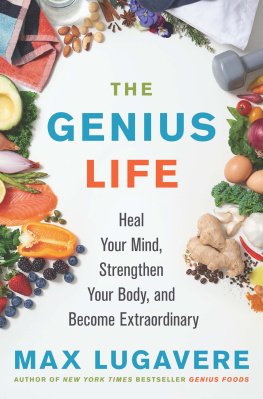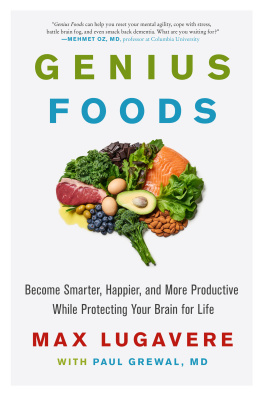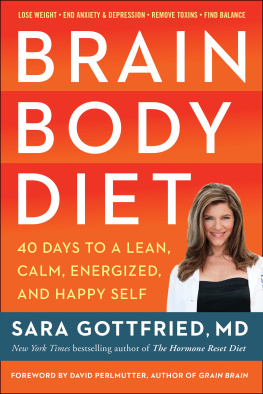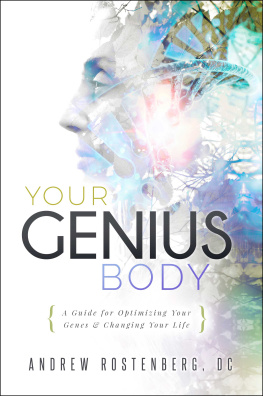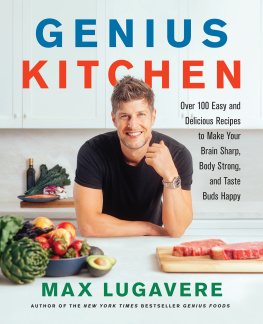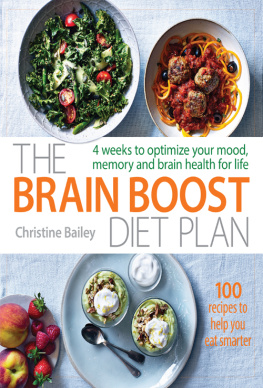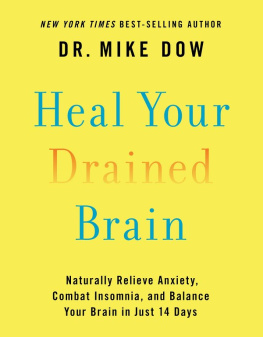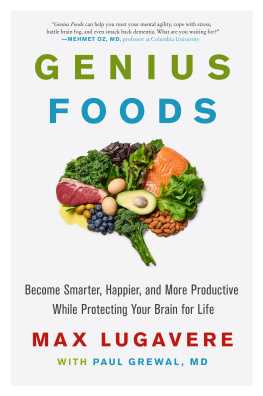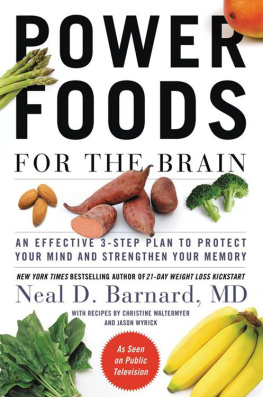Contents
Guide
Dedicated to my mom, Kathy. I love and miss you.
Contents
On the surface, my mother seemed to have checked all the boxes for a long life and great health. She wasnt overweight, didnt drink, and never smoked. She consumed lots of fruits and vegetables and always loaded up on low-fat and salt-free heart healthy grain products. So it was a shock to my family when, in 2010, at the age of fifty-eight, her brain began to fail her.
It was subtle at first but became apparent when wed cook togetherone of our favorite things to dothat her ability to perform simple tasks had become mentally labored. Id ask her to pass a ladle, for example, and it would take her a few extra seconds to respond. It was strange to see my mom suddenly struggle, but no one in my family had ever had brain problems. I thought I was just watching her get older.
Things got a little more serious when she told the family that she had seen a doctor in New York, but even then, the details of her visit were murky, lost in translation between the fear and confusion she was probably experiencing. In August of 2011, we decided to book a trip to the Cleveland Clinic in Ohio and that I would accompany her. After running a battery of esoteric tests, the neurologist looked up from his notes and assigned my mom a strange Parkinsons-like disease. Handing us a few prescriptions, he sent us on our way.
Later that night, I did what any millennial with a Wi-Fi connection would do and consulted the oracle of our time: Google. I learned that my mom had been prescribed drugs not only for Parkinsons disease, but for Alzheimers disease as well. Why Alzheimers disease? I wondered. Did this mean my mom was going to die? Or forget who I was?
As these questions began to circle my head, feelings of fear and helplessness started to bubble up and spill over like water boiling on too high a flame. My heart started pounding, the room went black, and all I could hear was a ringing in my ears. I was having a panic attack. How could this have happened to the person I loved most, and right under my nose? What could be done? How could I save her?
The next day, we flew back to New York and began making more doctors appointments. I went with her to all of them because if theres anything a career in journalism has taught me, it is how to ask questions. Desperate for answers, what wed get was often little more than diagnose and adios. Many times a doctor would add on a new drug to my mothers regimen or increase the dose of one she was already on.
Despondent but still hopeful, we kept searching. I did more research, we scheduled new appointments. And my mom always had a great attitude. Im happy that Ive gotten so far, shed say.
In the years that followed, my mothers symptoms grew worse, especially where thinking was concerned. Alzheimers disease makes a persons memories ephemeral, like chalk on a sidewalk. In my moms case, it was more like a slow and crippling strangulation of her brain power. She lost the ability to communicate with any depth or richness, and many times shed lose her train of thought soon after starting to speak.
Her eyesight suffered. Id catch her reaching for objects that werent there, or missing what she intended to pick up. Reading was one of her favorite hobbies (my mom loved to collect books), but she was no longer able to do it. She struggled with basic everyday habits of self-care, forgetting how to use the toilet, feed and wash herself, and pick up the phone. Even opening doors became a challenge. And, of course, she could no longer leave the house alone.
Then there were the movement problems. My mom gradually became less and less mobile, suffering from weakness, stiffness, and instability. She came to rely on me, her health aides, or my brothers to sit down, stand up, and everything in between.
I was tasked with filling her pillbox, which at one point had nearly a dozen different pharmaceuticals in it. Though they were meant to help, the medications never seemed to do anything but make her feel worse. Id often catch myself staring at the pastel-colored tablets, wondering how they each were interacting in her increasingly frail system. Giving them to her, Id often feel like I was deceiving her. But what choice did I have?
It was Labor Day 2018 when everything changed again. I was in Los Angeles for work when I received a call from my brother.
Mom is in the emergency room, he told me.
For what? I asked. I was with her only a few days before and had taken her to the doctor. There had been a decline in both her appetite and cognition, but the doctors visit was, as usual, frustratingly unremarkable.
She turned yellow, my brother told me. Confused and worried, my family had rushed her to get help.
Well, whats wrong? I asked.
They dont know, he said. They think it could be a gallstone, but...
Before he could finish his thought, I hung up the phone and changed my flight to get the next plane out. What now? I wondered, anxious the whole way home.
When I arrived at the emergency room the next day, my mom was unintelligible and, indeed, a bit yellow. The doctors had just done an MRI of her abdomen.
A gallstone would have been a perfectly good explanation for her unusual hue, but what they found was much worse: a tumor. It was on the head of my moms pancreas, pressing into her bile duct. This had caused bilirubin (the pigment that gives stool its color) to back up into her blood, seeping into her skin and eyes. And it looked like the cancer had already spread.
They put a stent into her bile duct, and we went home. It took a day or two for her color to return to normal. And her cognition improved right away. For the next twelve hours, she seemed almost like her old self. That night, my whole family present, we ordered Chinese food and put her favorite band, the Rolling Stones, on the TV.
The following three months, however, were wrought with pain, weight loss, and desperate attempts to find a cancer treatment that would buy time for my mom. There was infighting in my family as to how aggressively we should seek medical treatment. After trips to three different hospitals, it became clear that doctors were unable to offer her much, reminding me of all those early trips to neurologists offices. And all my mom wanted to do, it seemed, was stay at home.
At 11 a.m. on December 6, 2018, at the age of sixty-six, she passed away. I, my two brothers, Andrew and Benny, and our dad beside her.
My Hope for You
My mothers health suffered immensely, and watching her lose everything was heartbreaking. Was there anything that could have been done to avert her illness? What factors were to blame for her transformation from a seemingly healthy person to someone ravaged by disease? What could I do to improve my prospects for a long life with sound body and mind? Questions like these have become my obsession.
Although I began in the desperation of a family crisis, my search for answers has taught me more than I ever could have imagined about human health, and especially the brain. Ive had the privilege to learn from scientists at top research institutions around the world, and Ive been able to collaborate with many as well. Ive created educational tools used to teach the clinical practice of dementia prevention, and Ive even coauthored a chapter in a medical textbook on the topic. And my discoveries about the important connection between our brains and what we eat were the basis of my first book, Genius Foods. Since its publication in 2018, Ive received thousands of notes from doctors, nurses, dietitians, and nutritionists all around the world, many of whom have recommended it to their patients.
The work I did on Genius Foods changed my perspective on diet, but nutrition is a continually evolving scienceand its just one part of the puzzle for optimal health. So, in mid-2018, I launched a podcast, also called
Next page
